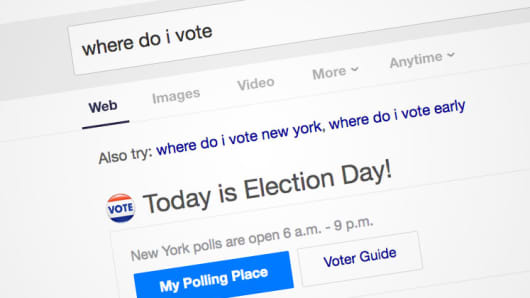With the presidential debates drawing more than 200 million viewers on TV alone, the race for the 45th presidency — ripe with scandals, insults and acrimony — has become the most watched election in U.S. history. In addition to TV coverage, debate live streams, online analyses and social media interactions are creating multiple avenues for spectators to access and participate in the election.
The gateway to these election experiences is internet search. Not long ago, search results were blue links on a screen that served as a starting point for researching specific topics. Search didn't answer users' queries — it returned results for where to click to find the answers.
While the blue links are still part of the search experience, the industry is moving towards surfacing answers directly on the results page. Popular election search terms demonstrate this more direct way of surfacing content:
- "Register to vote" returns important voting information, including relevant deadlines
- "Where to vote" helps users find their respective polling places and voter guides
- "Hillary Clinton" and "Donald Trump" surface rich info cards that that directly list stances, bio, family and other background details
- "Latest election results" keep users up-to-date on developments, including real-time election results
- "Presidential debates 2016" enable users to experience the debates livestream even after the event
By directly surfacing information critical to voter education, search is bolstering the participatory culture that is central to our democracy. In that discovery process, search also brings users new ways to stay connected to updates and engage in the larger dialogue. The debates are a good example. When users searched for a given debate, the query returned the livestream, post-debate analysis, and opportunities for users to exchange comments on a given story with the original writer and other citizen commentators.
The internet has become the town hall of 21st Century America. Search is the front door to that town hall, giving people increased and enhanced forms of participation throughout the election cycle.


